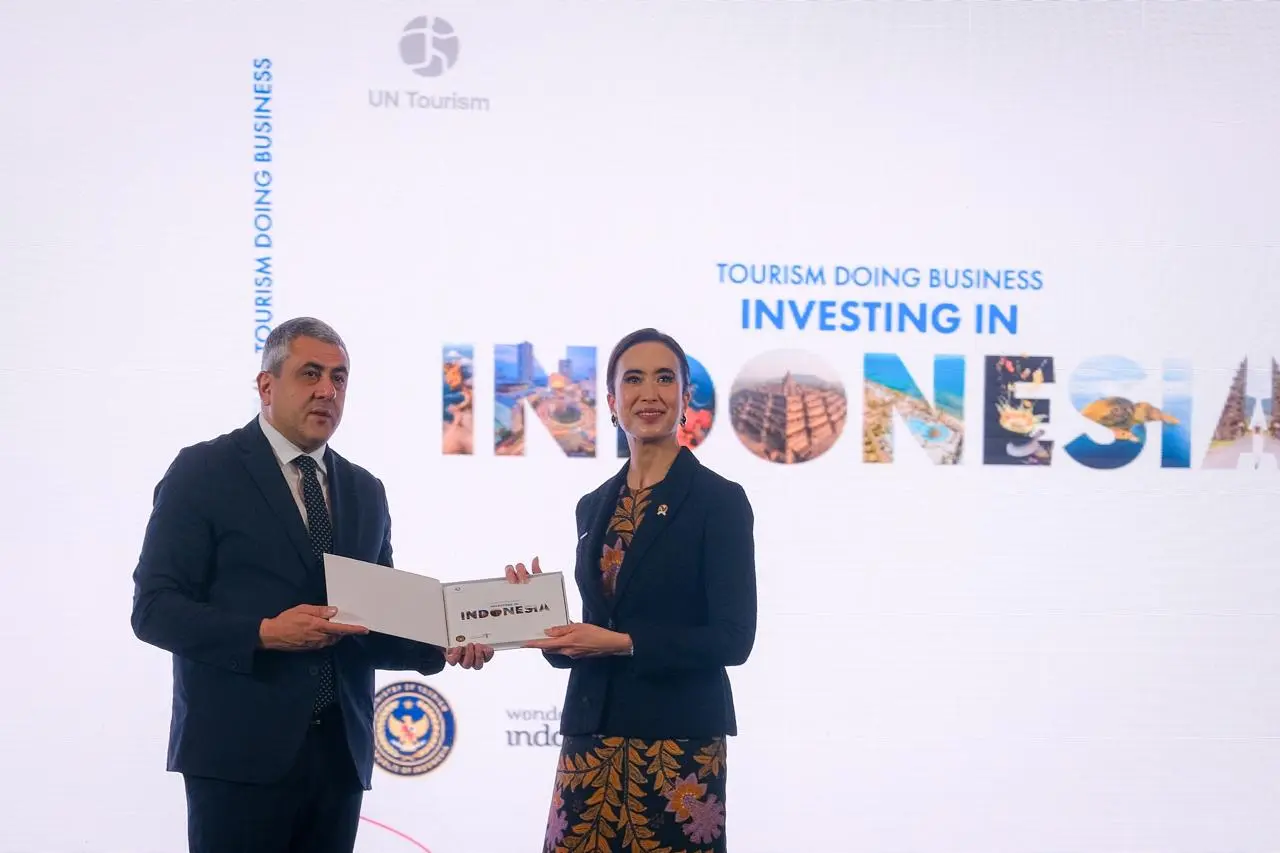Indonesia became the first country in the Asia-Pacific to launch a UN Tourism-endorsed investment guideline for the tourism sector. The guide, titled “Tourism Doing Business: Investing in Indonesia,” was officially introduced by Tourism Minister Widiyanti Putri Wardhana and UN Tourism Secretary-General Zurab Pololikashvili at the opening of the UN Regional Tourism Conference, held on April 16, 2025, in Jakarta.
“This joint effort is crucial in preserving our natural and cultural heritage while unlocking meaningful opportunities for the people, economy, and environment,” said Minister Widiyanti. Zurab added, “Investment is a priority in this region, and Indonesia has so much to offer — so many places, so many opportunities.”
This guideline is the first of its kind in Asia-Pacific and is designed to attract investors through structured policy insights, detailed market data, and a sustainable investment roadmap.
The 144-page document is both a marketing tool and an investment manual, developed by UN Tourism in collaboration with Indonesia’s Ministry of Tourism. It provides clear pathways for investors to understand economic outlooks, fiscal regimes, project pipelines, and policy incentives.
Economic Outlook: A Resilient Tourism Economy
Indonesia’s tourism sector rebounded strongly in 2024, recording 13.9 million international arrivals and over 1.02 billion domestic trips. Tourism contributed 4.5% to national GDP and supported employment for 25 million people, or 16% of the national workforce.
Domestic tourism expenditure reached an estimated USD 170.5 billion, while international receipts were USD 16.7 billion. The expected GDP growth for 2025 is 5.1%, reflecting stable macroeconomic fundamentals.
Investment Trends: USD 16.1 Billion in Tourism Inflows
Between 2018 and 2024, Indonesia attracted USD 16.1 billion in tourism investment. Foreign direct investment (FDI) accounted for USD 5.6 billion, while domestic investors contributed USD 10.5 billion. Hotel and restaurant projects led the sector, receiving USD 12.2 billion in total.
Indonesia ranks 6th among Asia-Pacific destinations for greenfield tourism projects, with 38 initiatives valued at USD 4.8 billion. Top contributors include the U.S., China, Japan, and India. Bali remains a key magnet, but other cities like Jakarta and Surabaya are gaining momentum.
Investment Advantages: Infrastructure and Incentives
The guideline outlines Indonesia’s unique value proposition for investors:
- Robust transport infrastructure with 66.7 million domestic and 18.9 million international air passengers in 2024.
- 550,000 km of roads and strong inter-island ferry networks.
- Incentives like tax holidays, depreciation allowances, and simplified licensing through the OSS system.
Indonesia also offers targeted fiscal advantages for Special Economic Zones (SEZs), particularly in Mandalika, Likupang, and Labuan Bajo.
Priority Destinations and Strategic Projects
The Indonesian government has designated ten national priority tourism destinations, supported by three greater areas (Jakarta, Bali, and Riau Islands). Highlighted investment projects include
- Mandalika International Circuit (USD 284.4 million): A motorsport SEZ in Lombok developed via PPP.
- F1H2O Powerboat Venue at Lake Toba (USD 2.3 million): Funded by the state to promote tourism in North Sumatra.
- Golo Mori Convention Hall in Labuan Bajo (USD 30.3 million): A state-owned eco-resort and events venue.
Deputy Minister Martini M. Paham emphasized that these destinations remain a focus but added that other regions with potential are also being promoted globally.
Green Investment and Sustainability Frameworks
Sustainability is at the core of Indonesia’s tourism strategy. The guideline highlights green tourism as a long-term pillar, supported by
- The Long-Term Strategy for Low Carbon and Climate Resilience 2050 (LTS-LCCR 2050).
- The Green Economy Strategy and Sustainable Tourism Development Roadmap.
- Financing mechanisms such as green sukuk, green bonds, and the Indonesia Quality Tourism Fund.
These tools aim to support eco-friendly developments that align profitability with environmental and social responsibility.
Innovation and Startups: Supporting the Tourism Ecosystem
The guide promotes innovation as a key driver for future investment. Indonesia’s startup ecosystem benefits from government programs like BEKUP, Wirausaha Merdeka, and the Entrepreneur Hub. Sectors such as eco-tourism, digital ticketing, and smart tourism services are rapidly growing.
Two standout ventures:
- Quantum Temple, a blockchain-based regenerative tourism platform, raised USD 1 million and operates at UNESCO sites like Pura Tirta Empul in Bali.
- Senang Eco Services: Offers sustainability consulting for hotels and restaurants, expanding internationally after partnering with WWF.
A Living Document to Guide Long-Term Investment
The Ministry of Tourism confirms that Tourism Doing Business: Investing in Indonesia is a “living document” that will be regularly updated in line with policy changes and market developments. It’s intended to serve as a dynamic tool for global promotion and domestic coordination.
Deputy Minister Rizki Handayani stated, “Indonesia wants to show that our national tourism policies and industry readiness for sustainable investment are already in place — and will continue to be strengthened.”
PHOTO: KEMENPAR.GO.ID
This article was created with AI assistance.
Read More






 Friday, 27-02-26
Friday, 27-02-26







